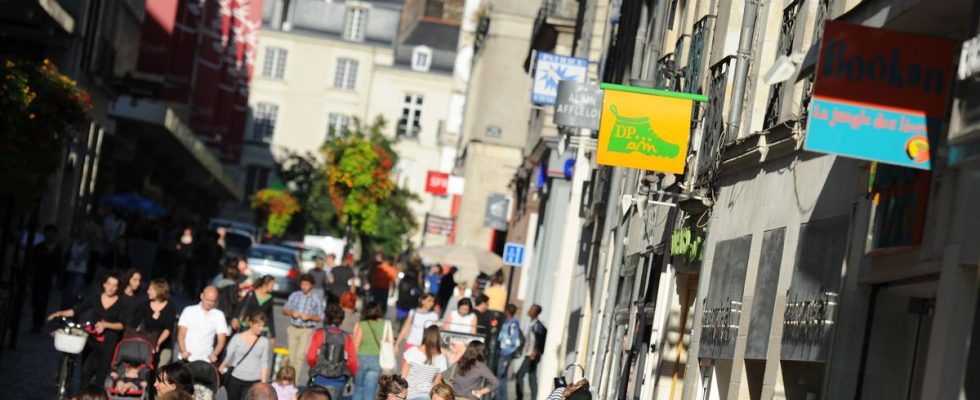Montpellier kicked off in September 2020, Nancy followed suit the following December, then Nantes made the same choice in April 2021. In these three major cities, public transport is free every weekend. A measure, intended to boost the use of buses and trams in the midst of the Covid crisis, which is still in place today. Something to arouse curiosity, even envy, in other communities. In Rennes, for example, the association of merchants in the city center had requested (in vain) free public transport for its large annual sale on June 28, but also for the first Saturday of the sales.
“City centers are suffering, trade has changed, it can no longer be seen as in the past”, regrets Laurence Taillandier. The president of Square Rennais is convinced that free transport would encourage people to come back. “Not necessarily to consume but to walk, to stroll”. “Overall, throughout France, the flow of customers is decreasing, confirms Eric Malezieux, director of the federation of traders and craftsmen of the metropolises of France (CAMF). Free entry at weekends is one of the solutions that would make city centers more attractive. But is free really the magic recipe imagined? Does it really translate into increases in turnover in the shops?
“People come to town much more easily”
In Nantes, free transport at the weekend actually generated a significant peak in travel on Saturday and Sunday: +15% on average. Pedestrian flows have also increased in the heart of the city by around 10%, according to the association of traders full center. “A 10% increase on Saturday is very positive,” proclaims its president, Teddy Robert. We receive, for example, customers later and later, until closing hours. People come to town for our shops but also for the entertainment, culture and heritage. Free is necessarily a facilitator. It’s the return we made to the Minister Olivia Gregoire. The finding is similar to Nancy. “We are seeing an increase in transport use of around 20%. People come to town much more easily, ”says the second deputy of the Meurthe-et-Moselle capital, Franck Muratet. In Montpellier, André Deljarry, the president of the Chamber of Commerce and Industry (CCI) of the Hérault, is also formal: since the tram and the buses are free, the frequentation of the heart of the city increases on Saturdays and Sundays.
“I don’t have a meter, but I have the impression, all the same, that the city center of Montpellier is very lively. Many people change their habits, “by taking public transport, adds Alain Simon, owner of a toy store and president of the federation of associations of traders, users and consumers of greater Montpellier (Faduc). “It’s the first step that counts,” he continues. From the moment when we say to ourselves that there is another possibility to get to the city center and that we use it, we say to ourselves “Why not a second time, etc?”. It must be said that parking in the city is becoming extremely complicated everywhere.
“No turning back is envisaged”
Be careful though: if free admission has indeed made it possible to increase the volume of visitors in the city center, this does not mean that they rush to the checkouts of traders. The nuance is important, according to Sébastien Duchauwicz, the president of the main association that represents them at Nancy. “Yes, it generates a lot of traffic but not necessarily customers,” he says. We did not have a considerable increase in turnover. Between the fear of Covid, galloping inflation and the protest movement against pension reform, sales are struggling to take off. “Perhaps the turnover has increased a little but, for lack of study, I cannot say so. Anyway, we must not delude ourselves, the period is complicated, ”judges Teddy Robert, the president of the merchants of downtown Nantes.
Major works, such as those of tram line 5 in Montpellier or those of the electric trolleybus in Nancy, also generate disruptions, at the risk of breaking the dynamism of free access. “We are afraid that consumers prefer to go to the commercial area,” worries the manager of a Nancy clothing store. The elected Franck Muratet wants to be reassuring. “The community creates an environment conducive to mobility, it gives opportunities to traders and it should promote economic dynamism. No turning back is envisaged today, especially in a period when environmental issues are important. »
Attentive, Rennes Métropole promises to organize a “citizen debate on the current subject 2024 or 2025”. Its vice-president, Mathieu Theurier, however expresses reluctance: “By making transport free on weekends, Nantes has deprived itself of 20 million in revenue per year. [6,5 millions d’euros en réalité, chiffre auquel il faut ajouter 3,5 millions d’euros de dépenses supplémentaires liées à un renforcement du service]. “In Nancy, the measure costs” around 2 million euros per year “to the metropolis, including free admission for those under 18, set up all week. In Montpellier, the cost of free admission at weekends for mainland France is estimated at 5.6 million euros per year. The Hérault capital is however preparing to take it up a notch: from December 21, the transport network will be free seven days a week.

